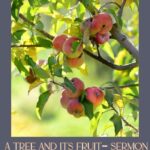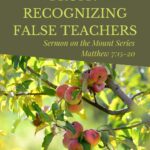EP 146: A Tree and Its Fruit (Matthew 7:15-20 – Sermon on the Mount Series)
Inside: We must be diligent students of the Word. We cannot be reminded enough that theology matters. Many people fall into following false teachers because they don’t know what God’s Word says. True character will eventually reveal itself. The fruit will eventually show the character of the tree. It will be clear if the fruit is rotten.

Jesus has strong words in our text today, and He is making clear that even though we are on the narrow road, it doesn’t mean we can just let our guard down. It is dangerous out there. There are false teachers desiring to lead us astray, and we need to learn how to recognize them. We can distinguish a false teacher from a true teacher of God’s Word by the fruit they bear.
God’s Word is clear that there is no neutrality with Jesus; you are either on the broad road to destruction or the narrow road to life.
Someone said in regard to this text: ”If you’re going to place poison on a shelf where you have healing medicines, you’d better label it clearly.”
We want to be able to clearly identify these false teachers before they do us harm.
Matthew 7:15-20
15 “Beware of false prophets, who come to you in sheep’s clothing but inwardly are ravenous wolves. 16 You will recognize them by their fruits. Are grapes gathered from thornbushes, or figs from thistles? 17 So, every healthy tree bears good fruit, but the diseased tree bears bad fruit. 18 A healthy tree cannot bear bad fruit, nor can a diseased tree bear good fruit. 19 Every tree that does not bear good fruit is cut down and thrown into the fire. 20 Thus you will recognize them by their fruits.
We have all heard the term false prophet, but what I found interesting is in the Old Testament, the term “false prophet” isn’t used even though it clearly references false prophets and gives us many descriptions.
True character will eventually reveal itself. The fruit will eventually show the character of the tree. It will be clear if the fruit is rotten.Jeremiah 14:14 reads:
14 And the Lord said to me: “The prophets are prophesying lies in my name. I did not send them, nor did I command them or speak to them. They are prophesying to you a lying vision, worthless divination, and the deceit of their own minds.
Jeremiah 23:16 tells us to tell the difference between someone like Jeremiah, who was a true prophet, and a false prophet – note in this verse where the false prophets’ information came from.
Jeremiah 23:16:
Thus says the Lord of hosts: “Do not listen to the words of the prophets who prophesy to you, filling you with vain hopes. They speak visions of their own minds, not from the mouth of the Lord.
Another note to be mindful of here – the punishment for being a false prophet in the Old Testament was extremely severe:
Deuteronomy 18:20:
But the prophet who presumes to speak a word in my name that I have not commanded him to speak, or who speaks in the name of other gods, that same prophet shall die.’
Jesus is clearly warning us in regard to false prophets.
“We have a tendency to associate prophecy with the foretelling of the future. But in fact, that was only a part (and actually a less prominent part) of the prophet’s ministry. The basic task of the prophet was to forth-tell, not just to fore-tell, God’s word. He was to explain and apply God’s truth to the lives of the people in his own day, as well as speak about the future. Indeed, the reason he was to speak about the future was to influence the way that his hearers lived in the present. Simply put, a ‘prophet’ was one who spoke from God. A false prophet is one who falsifies God’s word either by openly contradicting it, or, more likely (as Jesus indicates), by twisting its meaning.“
Sinclair Ferguson
We know that we battle as Christians the world the flesh and the devil, and we also need to do battle against false prophets—those who come to us in sheep’s clothing but are ravenous wolves.
One way we do this is to be diligent students of the Word. We cannot be reminded enough that theology matters, sound doctrine matters, truth matters. So many people fall into following false teachers because they don’t know what God’s Word says.
The term beware here means to watch out to be on guard, and it’s in the present imperative, so its means for us to continually be on the lookout for false prophets.
Just because someone is talking about things of the Lord doesn’t mean they actually belong to God, and it doesn’t mean they are actually proclaiming God’s truth.
Your best defense against false teaching is sound doctrine.
“False prophets encourage us to try to make ourselves Christians by adding something to our lives instead of becoming something new, and their work never quite rings true. A wolf can wear sheep’s clothing, but it cannot grow a sheep’s coat. It is possible to put grapes on thorns, and figs on thistles, but they cannot grow there. It is possible to subscribe to the qualities of the Beatitudes, and yet never truly own them from within. But appearances can only be kept up for so long. Time will reveal the true nature of the fruit. Sooner or later we will know where a man stands.”
R. Kent Hughes, The Sermon on the Mount: The Message of the Kingdom
Listen to EP 146: A Tree and Its Fruit:
Resources & Links Mentioned in this Episode:
Sermon on the Mount Series on the Blog
Sermon on the Mount Series Playlist on Spotify
Thankful Homemaker Free Library of Resources
Patreon Support
Justin Peters
Michelle Lesley
Thankful Homemaker Gear Shop
From our Shop
Whether you’re running errands, doing household chores, or sipping your coffee, you can do it in style, reminding yourself and others you are a Thankful Homemaker.
-
 Thankful Homemaker 3/4 Sleeve Raglan Shirt$23.00 – $25.00
Thankful Homemaker 3/4 Sleeve Raglan Shirt$23.00 – $25.00 -
 TH Ceramic Mug – Navy & Rust$13.50
TH Ceramic Mug – Navy & Rust$13.50
Show Notes:
“Similarly, shepherds invariably wore woolen clothing, made from the wool of the sheep they tended. That is the sheep’s clothing of which Jesus here speaks. False prophets do not deceive the flock by impersonating sheep but by impersonating the shepherd, who wears sheep’s clothing in the form of his wool garments. Just as the ancient false prophets often wore the garments of the true prophet, so false shepherds often disguise themselves as true shepherds. Satan’s man goes under the guise of God’s man, claiming to teach the truth in order to deceive, mislead, and, if possible, destroy God’s people. Scripture speaks of three basic kinds of false teachers: heretics, apostates, and deceivers. Heretics are those who openly reject the word of God and teach that which is contrary to divine truth. Apostate teachers are those who once followed the true faith but have turned away from it, rejected it, and are trying to lead others away. Those two kinds of false teachers at least have the virtue of a certain honesty. They do not claim to represent orthodox, biblical Christianity. The false shepherd (the deceiver), on the other hand, gives the appearance of orthodoxy, frequently with great declarations and fanfare. He is not a liberal or a cultist but one who speaks favorably of Christ, the Cross, the Bible, the Holy Spirit, and so on, and who associates with true believers. He may go out of his way to appear orthodox, fundamental, and evangelical. From his looks, vocabulary, and associations, he gives considerable evidence of genuine belief. But he is not genuine; he is a fake and a deceiver. He has the speech of orthodoxy but is a living lie.”
John MacArthur, Matthew 1-7 Commentary
“The picture we need to have in our minds, therefore, should rather be this. The false prophet is a man who comes to us, and who at first has the appearance of being everything that could be desired. He is nice and pleasing and pleasant; he appears to be thoroughly Christian, and seems to say the right things. His teaching in general is quite all right and he uses many terms that should be used and employed by a true Christian teacher. He talks about God, he seems to be saying everything that a Christian should say. He is obviously in sheep’s clothing, and his way of living seems to correspond. So, you do not suspect that there is anything wrong at all; there is nothing that at once attracts your attention or arouses your suspicions, nothing glaringly wrong.”
~ Martyn Lloyd Jones, Studies in the Sermon on the Mount
“There is someone standing by my side, who looks just like a member of the Church. He is a prophet and a preacher. He looks like a Christian; he talks and acts like one. But dark powers are mysteriously at work; it was those who sent him into our midst. . . . He may even be unconscious himself of what he is doing. The devil can give him every encouragement and, at the same time keeps him in the dark about his own motives.”
~ Dietrich Bonhoeffer
“There is nothing to make anyone uneasy, but rather only things that make people feel good, content, and falsely assured. They characterize anyone who preaches otherwise as negative.”
~ R. Kent Hughes, The Sermon on the Mount: The Message of the Kingdom
“There are many who would try to guide us along the broad path that leads to destruction; how can we guard ourselves against them? We guard ourselves against false prophets by taking heed of their fruits. This means paying attention to many aspects of their life and ministry. We should pay attention to the manner of living a teacher shows. Do they show righteousness, humility, and faithfulness in the way they live? We should pay attention to the content of their teaching. Is it true fruit from God’s Word, or is it man-centered, appealing to ears that want to be tickled? We should pay attention to the effect of their teaching. Are people growing in Jesus or merely being entertained and eventually falling away? This fruit is the inevitable result of who we are. Eventually – though it may take a time for the harvest to come – the good or bad fruit is evident, revealing what sort of “tree” we are.”
~ David Guzik
“There is nothing in their preaching which searches the conscience and renders the empty professor uneasy, nothing which humbles and causes their hearers to mourn before God; but rather that which puffs up, makes them pleased with themselves and to rest content in a false assurance.”
~ A.W. Pink
“False prophets encourage us to try to make ourselves Christians by adding something to our lives instead of becoming something new, and their work never quite rings true. A wolf can wear sheep’s clothing, but it cannot grow a sheep’s coat. It is possible to put grapes on thorns, and figs on thistles, but they cannot grow there. It is possible to subscribe to the qualities of the Beatitudes, and yet never truly own them from within. But appearances can only be kept up for so long. Time will reveal the true nature of the fruit. Sooner or later we will know where a man stands.”
~ R. Kent Hughes, The Sermon on the Mount: The Message of the Kingdom
“False prophets talk much about the love of God but nothing of His holiness, much about people who are deprived but nothing about those who are depraved, much about God’s universal fatherhood of every human being but nothing about His unique fatherhood only of those who are His children through faith in His Son, Jesus Christ, much about what God will give to us but nothing about obedience to Him, much about health and happiness but nothing about holiness and sacrifice. Their message is a message of gaps, the greatest gap of which leaves out the truth that saves.”
~ John MacArthur, Matthew 1-7 Commentary
“Sound doctrine and holy living are the marks of true prophets.
“Finally, we must remember that whatever we may think of these things, and however wrongly we may judge, and however much we may be deceived by false prophets, God is the judge, and God is never deceived. `Every tree therefore which bringeth not forth good fruit is hewn down, and cast into the fire.’ God have mercy upon us. May He awaken us to these vital principles, and enable us to exercise this discrimination with regard to ourselves and with regard to all others who may be a danger to our souls, and who are grievously misrepresenting the cause of our blessed Lord in this sinful and needy world. Let us concentrate upon being certain that we have the divine nature, that we are partakers of it, that the tree is good; because if the tree is good, the fruit also must of necessity be good.”
~ Martyn Lloyd Jones, Studies in the Sermon on the Mount
Scripture References:
- Matthew 7:15-20
- Jeremiah 14:14
- Jeremiah 23:16
- Deuteronomy 18:20
- Matthew 24:11
- Matthew 24:24
- 2 Peter 2:1
- Jeremiah 6:14
- Isaiah 30:10
- 2 Corinthians 11:13-15
- Matthew 5:13-16
- Matthew 5:20
- Galatians 5:22-23
- John 14:6
- 2 Timothy 2:24-26
- Matthew 23:33
Recommended Resources:
- Studies in the Sermon on the Mount by Martyn Lloyd Jones
- Sermon on the Mount The: Matthew 5-7 Expositional Commentary by James Montgomery Boice
- Matthew 1-7 MacArthur New Testament Commentary by John MacArthur
- Expository Thoughts on the Gospel of Matthew by J.C. Ryle
- The Sermon on the Mount: The Message of the Kingdom (ESV Edition) by R. Kent Hughes
- Sermon on the Mount by Sinclair Ferguson
- The Beatitudes: An Exposition of Matthew 5:1-12 by Thomas Watson
- The Message of the Sermon on the Mount by John Stott
- Sermon on the Mount Teaching Series by Sinclair Ferguson at Ligonier Connect
- Logos Bible Software
- Bible Memory App
- Study Guide for Sermon on the Mount





